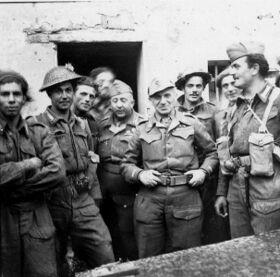The Kontin Mutiny: Difference between revisions
No edit summary |
No edit summary |
||
| Line 1: | Line 1: | ||
{{Template:WIP}} | |||
[[Category:Second Europan War]] | |||
[[Category:Battles of the Second Europan War]] | |||
{{infobox military conflict | {{infobox military conflict | ||
| conflict = The Kontin Mutiny | | conflict = The Kontin Mutiny | ||
Revision as of 11:46, 2 June 2020
This article is incomplete because it is pending further input from participants, or it is a work-in-progress by one author. Please comment on this article's talk page to share your input, comments and questions. Note: To contribute to this article, you may need to seek help from the author(s) of this page. |
The Kontin Mutiny (25 June - 1 July 1945) was one of the last battles that took place during the Second Europan War and one of the most controversial battles that took place during the Battle of Kontin.
It began on 22 June when Marshal Count Thạch Hung Sõn Chiến ordered his Archadian counterpart, Marshal Victor Sazabio to attempt to relieve the city from the south, link up with Generals Quang and Le's forces in an effort to stall the allied attacks on Kontin. Switching his concern for his own troops, Sazabio insisted that it was suicidal and was fed up with Chiến's demeanour. Instead of following orders, Sazabio disobeyed and ordered his troops to fight their way to Kontin in order to rescue civilians but not to relieve the city.
On 24 June, Sazabio ordered a ceasefire of all Archadian forces. The same day, he visited Allied Headquarters under a white flag and negotiated surrender of all Archadian forces to Brigadier Tsukuyo Kushineda. Accounts said that Sazabio was only willing to surrender unconditionally if the Allied forces would help the Archadian forces attempt to help escaping civilians. Kushineda, under permission from Marshal Sugiyama, agreed.
The following day, the first Archadian skirmishes against the Quenminese began on the south of Kontin. With help from the 7th Armoured Division, the Archadians were able to help civilians escape. News of Sazabio's mutiny reached Chien in the city, Quang and Le's forces to the north. The mutiny also reached Grand Marshal Rodolfo Graziani. Chien was infuriated while Graziani reluctantly supported since Graziani had been already been negotiating a surrender since 21 June. Quang and Le were ordered by Chien to get rid of Sazabio's formation in the south by swinging to the other side of the city and engage the Southern flank.
However, Le and Quang questioned Chien's orders in secrecy, being that it was already suicidal and wanted to save lives as much as they could. Instead, they joined Sazabio's mutiny. They radioed their intention to join, which reached Sazabio on the night of the 26th. On the morning of 27 June, Chien threw a loud tantrum and would declare to kill Sazabio, Le, and Quang whichever means necessary. On the afternoon, Chien radioed for reinforcements from the capital. About 95,000 troops still loyal to the Imperials arrived and engaged with the mutineers. The attack failed and on the 29 June, the mutineers allowed allied troops to enter Kontin on all sides.
The Mutiny marked the first time that the Quenminese and the Archadians fought on the same side with the Allies. When it reached Lord Mountbatten, he automatically granted a pardon to the mutineers and assured that they would get a position in the occupation force of Quenmin.
After the war, nearly 80% of the Archadians refused to return home for fear of being executed for crimes and settled in Commonwealth countries, particularly in Concordia. Despite Graziani's grant of pardon to all mutineers, some did not return. Only 10% of the mutineers returned to Archadia.
Sazabio's honours and ranks remained untouched by Graziani but decided to retire. However, he was requested to establish the Royal Hung Yen Police Force. When he agreed, he became the first Chief Constable. Le and Quang were reinstated in the new Royal Quenminese Army and served on the post war crisis under the Quenminese Security Task Force.
